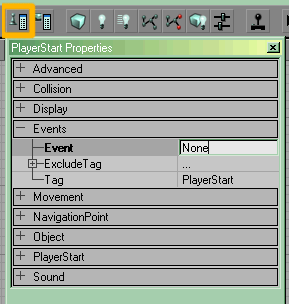This is a Category:Legacy Basic Procedure tutorial page. It explains how to perform a single procedure which is required in many different contexts.
The Actor Properties Window holds all the settings for an actor. It always updates itself to display information for the currently selected actor or actors.
Contents
Select the actor
Click on an actor to select it. Its icon or mesh should turn slightly green. To select more than one actor, hold down CTRL while you click.
Open the window
If the properties window is not already open, open it now. Do one of:
- Actor Context Menu -> <classname> Properties (the first item in the menu)
- Press the button on the toolbar (highlighted in the screenshot below)
- Press the F4 key
- UnrealEd Main Menu -> View -> Actor Properties
Within this window you can edit the properties for the currently selected Actor. Note that this window isn't a dialog box, there's no "OK" button: changes to properties affect the actor immediately.
The title bar of this window tells you what you are currently editing and how many of them: in the screenshot above, the currently selected actor is a PlayerStart.
Set the property
Every actor has dozens of properties, organized into groups. Each group can be expanded or collapsed by clicking the [+] or [-] sign to the left of the name. On Unreal Wiki, we write the name of a property like this:
- PropertyGroup -> PropertyName
To find this property, first find the group, expand it, then find the property. Both groups and properties are listed in alphabetical order.
To the right of each property name is the value it currently holds. To change this value, simply click on it: it turns into an active text field into which you can type. Within this field, you can use the mouse to position the cursor or select text.
Tip 1: cut, copy, paste
The usual Cut, Copy, Pasty keyboard shortcuts work within the text edit fields. You can copy values between properties, and between actors. This is particularly useful when matching tags.
Tip 2: maths expressions
Typing a numerical expression will store the result. For example,
64*4
will set the property to 256. In UnrealEd 2 you need to type
=64*4
Related Topics
- more on working with Actors, see Actor Overview. This also gives an overview of the property groups such as "Advanced", "Events", etc.
- more on parts of the UnrealEd Interface
- Related Basic Procedure: Match These Tags
- Related Basic Procedure: set the resource property

